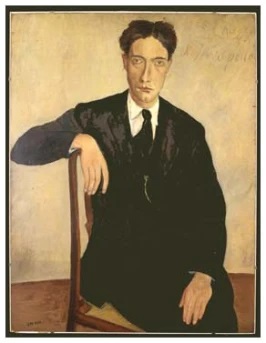
[ad_1]
Luigi Dallapiccola, Half II, 2024
This Week in Classical Music: March 4, 2024. Luigi Dallapiccola, Half II. Final week, we ended the story of the Italian composer Luigi Dallapiccola in the beginning of WWII. Mussolini’s  fascist state had handed race legal guidelines that restricted the civil rights of the Italian Jews, affecting Dallapiccola straight, as his spouse was considered one of them. Later legal guidelines would strip the Jews of their property and ship them into inner exile. Italy was no Germany, and these legal guidelines weren’t enforced by the Mussolini fascists as they have been by the Nazis: no Italian Jews have been killed by the regime simply because they have been Jews (many political opponents of Mussolini have been imprisoned and executed, and a few of them have been Jewish). That state of affairs abruptly modified in 1943 when the Italian military surrendered to the Allies, and in response, the Nazis occupied all the northern a part of Italy. Throughout these years, Dallapiccola and his spouse lived in Florence, the place he was educating on the conservatory – Florence was a part of the occupied territory. In 1943 and once more in 1944, they have been compelled into hiding, first in a village exterior the town, then in flats in Florence.
fascist state had handed race legal guidelines that restricted the civil rights of the Italian Jews, affecting Dallapiccola straight, as his spouse was considered one of them. Later legal guidelines would strip the Jews of their property and ship them into inner exile. Italy was no Germany, and these legal guidelines weren’t enforced by the Mussolini fascists as they have been by the Nazis: no Italian Jews have been killed by the regime simply because they have been Jews (many political opponents of Mussolini have been imprisoned and executed, and a few of them have been Jewish). That state of affairs abruptly modified in 1943 when the Italian military surrendered to the Allies, and in response, the Nazis occupied all the northern a part of Italy. Throughout these years, Dallapiccola and his spouse lived in Florence, the place he was educating on the conservatory – Florence was a part of the occupied territory. In 1943 and once more in 1944, they have been compelled into hiding, first in a village exterior the town, then in flats in Florence.
As soon as the struggle was over, Dallapiccola’s life stabilized. His opera Il prigioniero (The Prisoner), which he composed through the years 1944-48, was premiered in 1950 in Florence (the opera was based mostly partly on the cycle Canti di prigionia, the primary tune of which we offered in our entry final week). The opera’s music was serialist; it was one of many first full operas on this type, as Berg’s Lulu, the primary serialist opera, had not but been completed. Hermann Scherchen, one of many utmost champions of Twentieth-century music, performed the premiere. Regardless of the music’s complexity, it was usually carried out within the Fifties and ‘60s. Instances have modified, nevertheless it’s nonetheless being carried out, often. Right here is the Prologue and the primary Intermezzo (Choral) of the opera, about eight minutes of music. It was recorded dwell in Bologna on April 16th of 2011; Valentina Corradetti is the soprano singing the function of Mom, the orchestra and refrain of the Teatro Comunale di Bologna are performed by Michele Mariotti.
In 1951, Serge Koussevitzky, the music director of the Boston Symphony and himself a champion of recent music, invited Dallapiccola to offer lectures on the Tanglewood Pageant. After that first journey, Dallapiccola usually traveled to the US, typically staying for a very long time. Dallapiccola, who spoke English, German and French, additionally traveled in Europe. Apparently, he by no means visited the Darmstadt Summer season College, the gathering place for younger composers equivalent to Karlheinz Stockhausen, Pierre Boulez, Luigi Nono and Bruno Maderna, who have been experimenting with serial music and growing new idioms. It’s particularly shocking contemplating that he was very near Luigi Nono, and that Luciano Berio, additionally a Darmstadt habitué, was his former scholar. It appears that evidently the Darmstadt composers have been too cerebral and too radical for Dallapiccola, whose items, whereas strictly serial throughout that interval, have been infused with lyricism, considerably within the method of considered one of his idols, Alban Berg.
Dallapiccola’s final massive composition was the opera Ulisse, which premiered in Berlin in 1968; Lorin Maazel was the conductor. After that, Dallapiccola composed little or no, his time went into adapting a few of his lectures right into a guide. He died on February 19th of 1975 in Florence.
In 1971 Dallapiccolo compiled two suites based mostly on Ulisse. Right here is considered one of them, known as Suite/A. The soprano Colette Herzog is Calypso, the baritone Claudio Desderi is Ulysses. Ernest Bour conducts the Refrain and the Philharmonic Orchestra of the French Radio.
[ad_2]